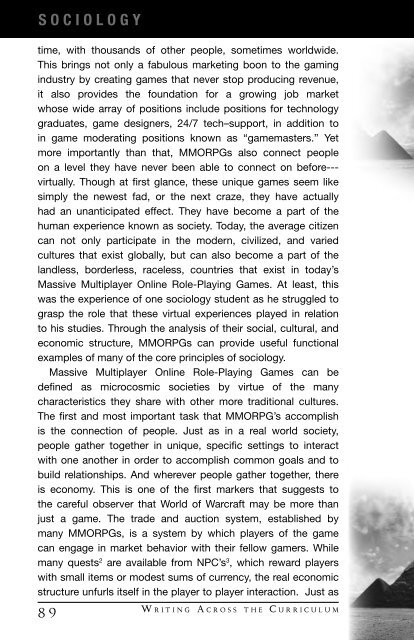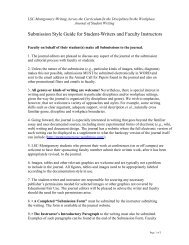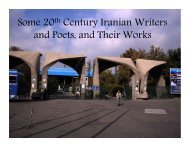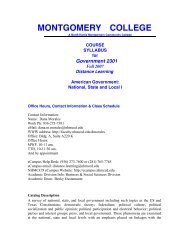2008 - Communication Across the Curriculum (CAC)
2008 - Communication Across the Curriculum (CAC)
2008 - Communication Across the Curriculum (CAC)
Create successful ePaper yourself
Turn your PDF publications into a flip-book with our unique Google optimized e-Paper software.
S o c i o l o g y<br />
time, with thousands of o<strong>the</strong>r people, sometimes worldwide.<br />
This brings not only a fabulous marketing boon to <strong>the</strong> gaming<br />
industry by creating games that never stop producing revenue,<br />
it also provides <strong>the</strong> foundation for a growing job market<br />
whose wide array of positions include positions for technology<br />
graduates, game designers, 24/7 tech–support, in addition to<br />
in game moderating positions known as “gamemasters.” Yet<br />
more importantly than that, MMORPGs also connect people<br />
on a level <strong>the</strong>y have never been able to connect on before---<br />
virtually. Though at first glance, <strong>the</strong>se unique games seem like<br />
simply <strong>the</strong> newest fad, or <strong>the</strong> next craze, <strong>the</strong>y have actually<br />
had an unanticipated effect. They have become a part of <strong>the</strong><br />
human experience known as society. Today, <strong>the</strong> average citizen<br />
can not only participate in <strong>the</strong> modern, civilized, and varied<br />
cultures that exist globally, but can also become a part of <strong>the</strong><br />
landless, borderless, raceless, countries that exist in today’s<br />
Massive Multiplayer Online Role-Playing Games. At least, this<br />
was <strong>the</strong> experience of one sociology student as he struggled to<br />
grasp <strong>the</strong> role that <strong>the</strong>se virtual experiences played in relation<br />
to his studies. Through <strong>the</strong> analysis of <strong>the</strong>ir social, cultural, and<br />
economic structure, MMORPGs can provide useful functional<br />
examples of many of <strong>the</strong> core principles of sociology.<br />
Massive Multiplayer Online Role-Playing Games can be<br />
defined as microcosmic societies by virtue of <strong>the</strong> many<br />
characteristics <strong>the</strong>y share with o<strong>the</strong>r more traditional cultures.<br />
The first and most important task that MMORPG’s accomplish<br />
is <strong>the</strong> connection of people. Just as in a real world society,<br />
people ga<strong>the</strong>r toge<strong>the</strong>r in unique, specific settings to interact<br />
with one ano<strong>the</strong>r in order to accomplish common goals and to<br />
build relationships. And wherever people ga<strong>the</strong>r toge<strong>the</strong>r, <strong>the</strong>re<br />
is economy. This is one of <strong>the</strong> first markers that suggests to<br />
<strong>the</strong> careful observer that World of Warcraft may be more than<br />
just a game. The trade and auction system, established by<br />
many MMORPGs, is a system by which players of <strong>the</strong> game<br />
can engage in market behavior with <strong>the</strong>ir fellow gamers. While<br />
many quests 2 are available from NPC’s 3 , which reward players<br />
with small items or modest sums of currency, <strong>the</strong> real economic<br />
structure unfurls itself in <strong>the</strong> player to player interaction. Just as<br />
8 9<br />
W r i t i n g A c r o s s t h e C u r r i c u l u m






